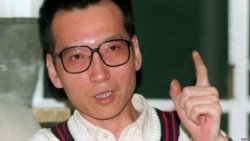Chinese human rights prisoner Liu Xiaobo died Thursday at age 61 following a high-profile battle with liver cancer that made his death as controversial as his life.
Liu, a Nobel Peace Prize laureate who spent his last eight years as a prisoner of conscience, passed away at a hospital in Shenyang, China, where he had been moved from his prison cell in the final stage of his illness.
His final days were marked by a public dispute over the quality of his care and Beijing's refusal of a family request that he be transferred for treatment to the United States or Germany.
Liu's reputation as an outspoken dissident had deep roots. In his brief, government-sanctioned role as a popular writer and college lecturer, he was known for his criticism of traditional Chinese culture and for urging his fellow literati to exhibit more individualism.
His promising career took a drastic turn in the spring of 1989 when he cut short a visiting scholarship at Columbia University in New York City and returned home to join student-led protests in Tiananmen Square.
Following a violent crackdown known by Chinese as the June 4th Massacre, Liu was labeled a “black hand” and jailed.
Upon his release in early 1991, he continued to call for political reforms and was sentenced to three years in a labor camp from 1996 to 1999. Liu kept on pursuing his reform goals after his release.
End to one-party system
In 2008, Liu and other dissidents and intellectuals issued a document known as Charter 08, modeled partly on Charter 77, which Czech dissidents, including Vaclav Havel, drafted in 1977.
Charter 08 calls for an end to China's one-party system and establishment of a new republic comprising a “federation” of regions and political communities, with genuine participation from the public.
“If there has been any progress in the Chinese society and politics over the last 20 years, it is all because the citizens have been pushing for change,” Liu said in an interview that year. “Ultimately, change will happen when problems persist and enough people are concerned.”
Even while he was enjoying relative freedom out of jail, thoughts of when he, and others like him, might be locked up again were never far from his mind.
“For those of us in the opposition movement under dictatorships, part of our job is confronting police, and spending time in prison. So, a dissident not only needs to learn how to oppose oppression, but also how to face the crackdowns, and time in prison,” Liu told reporters from Hong Kong.
Liu's convictions were put to the test in 2009, when he was sentenced to 11 years in prison for his part in the Charter 08 movement and other "subversive" activities. Worldwide fame came soon afterward when he was named as the 2010 Nobel Peace Prize laureate “for his long and non-violent struggle for fundamental human rights in China.”
Liu learned of the honor from his wife during one of the limited prison visits she was permitted. He replied that the prize should be dedicated to those who died in the 1989 mass protests and subsequent crackdown.
'I have no enemy'
Liu was known as an advocate of changing China through reasoned, non-violent means. Shortly before being sentenced in 2009, Liu praised elements of the Chinese legal system, including the polite treatment he received in jail, in a speech entitled “I have no enemies.”
“Hatred can corrupt one’s conscience and intelligence, enemy mentality could poison a nation’s spirit,” Liu said in the speech, which was read in his absence at the Nobel Prize ceremony.
Liu’s remarks confounded many advocates for democracy and freedom for China.
Critics pointed to the harsh treatment, including severe torture, of other activists to show the Chinese prison system is far less “humane” than Liu described it. Some suggested the authorities purposely showed leniency toward Liu so that he would make public statements in their support.
Liu’s critics cite the example of human rights lawyer Gao Zhisheng who, upon his release, couldn’t be recognized by his family because he was tortured so severely in jail.
They also point to the Hunan activist and organizer Li Wangyang, who lost his eyesight and most of his teeth from repeated head beatings, and was paralyzed when he was released in 2011; Li died mysteriously in a hospital in 2012, days after he told Hong Kong reporters that "even if they cut off my head, I would not turn back” from his activism.
Wish to leave China unfulfilled
Liu was still three years from completing his prison term when he died in the First Hospital of China Medical University, located in the northeastern city of Shenyang.
The German and American doctors who were allowed to see him during his last days reported that Liu, days before his death, had clearly communicated his wish to leave China for treatment elsewhere.
The doctors said that “additional options (of treating Liu) may exist, including interventional procedures and radiotherapy,” but “the medical evacuation would have to take place as quickly as possible.” However, Chinese authorities maintained that he was too sick to be moved.
Liu Xiaobo is survived by a son, and his wife of 21 years, Liu Xia, a staunch supporter of her husband who is reported to have said that she was determined to marry the "enemy of the state."
Reflecting on their lives in a poem, she said, “I like to draw trees; why? I like the image of it standing. A life spent standing must be tiresome, you say; I answer, yes, but still I must.”






